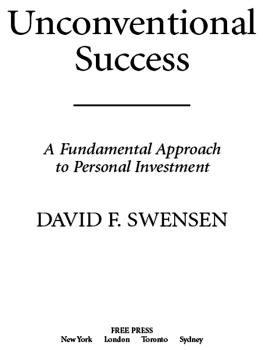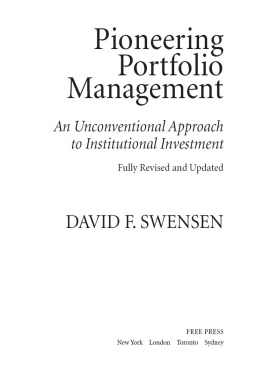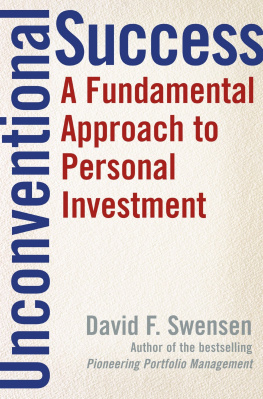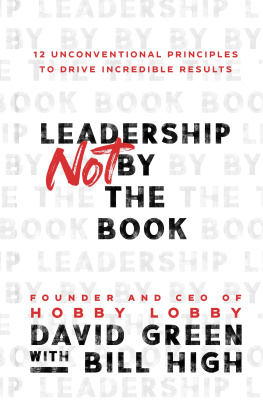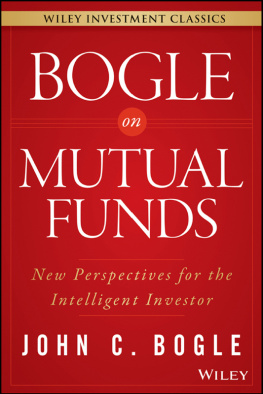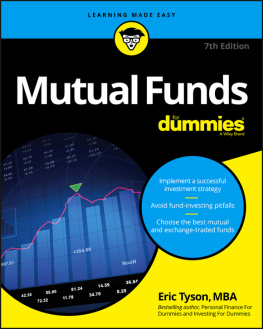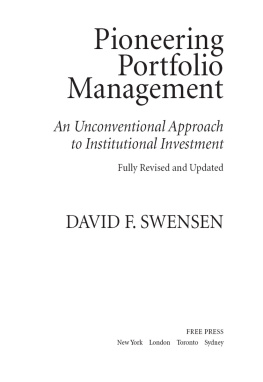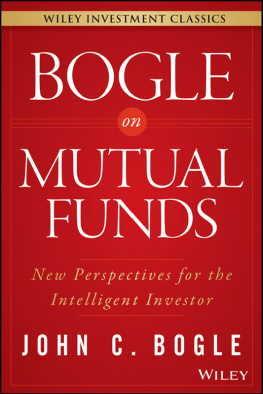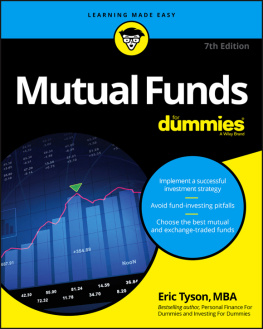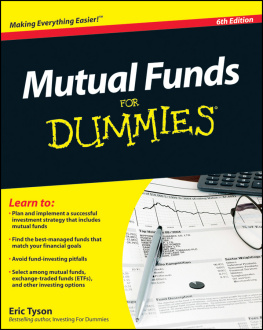David F. Swensen - Unconventional Success
Here you can read online David F. Swensen - Unconventional Success full text of the book (entire story) in english for free. Download pdf and epub, get meaning, cover and reviews about this ebook. City: New York, year: 2005, publisher: Free Press, genre: Business. Description of the work, (preface) as well as reviews are available. Best literature library LitArk.com created for fans of good reading and offers a wide selection of genres:
Romance novel
Science fiction
Adventure
Detective
Science
History
Home and family
Prose
Art
Politics
Computer
Non-fiction
Religion
Business
Children
Humor
Choose a favorite category and find really read worthwhile books. Enjoy immersion in the world of imagination, feel the emotions of the characters or learn something new for yourself, make an fascinating discovery.
- Book:Unconventional Success
- Author:
- Publisher:Free Press
- Genre:
- Year:2005
- City:New York
- Rating:5 / 5
- Favourites:Add to favourites
- Your mark:
- 100
- 1
- 2
- 3
- 4
- 5
Unconventional Success: summary, description and annotation
We offer to read an annotation, description, summary or preface (depends on what the author of the book "Unconventional Success" wrote himself). If you haven't found the necessary information about the book — write in the comments, we will try to find it.
Unconventional Success — read online for free the complete book (whole text) full work
Below is the text of the book, divided by pages. System saving the place of the last page read, allows you to conveniently read the book "Unconventional Success" online for free, without having to search again every time where you left off. Put a bookmark, and you can go to the page where you finished reading at any time.
Font size:
Interval:
Bookmark:

A LSO BY D AVID F. S WENSEN
Pioneering Portfolio Management

FREE PRESS
A Division of Simon & Schuster, Inc.
1230 Avenue of the Americas
New York, NY 10020
Copyright 2005 by David F. Swensen
All rights reserved, including the right of reproduction in whole or in part in any form.
F REE P RESS and colophon are trademarks of Simon & Schuster, Inc.
Library of Congress Cataloging-in-Publication
Data Control Number: 2005044086
ISBN-10: 0-7432-7461-X
ISBN-13: 978-0-7432-7461-6
Visit us on the World Wide Web:
http://www.SimonSays.com
I dedicate this book to my children:
my wonderful daughter, Tory,
who even as a teenager shines as my beautiful baby girl;
my golfing partner, Alex, who
teaches me something every day about
the meaning of courage;
and my sports-crazed son, Tim,
who always seems to know how to
bring a smile to my face.
Unconventional Success contains my opinions and ideas. The strategies outlined in this book will not suit every individual. No warranties or guarantees exist regarding the realization of any particular result. The publisher and I specifically disclaim responsibility for any loss incurred as a consequence of the application of the contents of this book. Caveat lector.
Readers should know that I serve as a trustee of Teachers Insurance and Annuity Association, better known as one part of the TIAA-CREF acronym. In a number of instances in the book, I make generally favorable references to TIAA, particularly with respect to the organizations single-minded devotion to its clients. My economic interests in TIAA consist of the customary and usual trustees fees that I earn and the performance that I expect on my retirement accounts with TIAA-CREF. The views that I express do not necessarily reflect those of the governing boards of management of TIAA and CREF.
This book would not exist were it not for the extraordinary efforts of three of my colleagues in the Yale Investments OfficeKimberly Sargent, Randy Kim, and Carrie Abildgaard. Unflagging in their devotion and tireless in their execution, Kimberly, Randy, and Carrie assisted me with every aspect of the production of this manuscript. Their unfailing good humor turned a labor of love into a truly joyful experience.
Dean Takahashi, my friend for nearly three decades and my colleague for nearly two, infuses the work of the Yale Investments team with intellectual rigor and vigor. His influence and thinking permeate this book. Our personal and professional collaboration continues to bring great satisfaction to me and, not incidentally, substantial resources to Yale.
My manuscript benefited enormously from constructive comments made by my colleagues Seth Alexander, Jay Kang, Dan Kilpatrick, and Ken Miller. My brother, Steve Swensen, assisted me from the perspective of an astute, nonfinancial professional. In spite of their help, errors remain, for which I take full responsibility.
W hen I began my work on Unconventional Success , I contemplated writing a different book. My first volume, Pioneering Portfolio Management: An Unconventional Approach to Institutional Investment, drew on my years of experience as Yale Universitys chief investment officer to provide a template for other institutions to use in managing their funds. Pioneering Portfolio Management describes an equity-oriented, broadly diversified, actively managed investment program. I expected that Unconventional Success would resemble Pioneering Portfolio Management , adjusting only for differences between the resources and instruments available to institutions and to individuals.
As I gathered information for my new book, the data clearly pointed to the failure of active management by profit-seeking mutual-fund managers to produce satisfactory results for individual investors. Following the evidence, I concluded that individuals fare best by constructing equity-oriented, broadly diversified portfolios without the active management component. Instead of pursuing ephemeral promises of market-beating strategies, individuals benefit from adopting the ironclad reality of market-mimicking portfolios managed by not-for-profit investment organizations.
The colossal failure of the mutual-fund industry carries serious implications for society, particularly regarding retirement security for American workers. I share with most economists the bias that free markets generally produce superior outcomes, believing that government intervention often creates more problems than it solves. However, the market failure resulting from the mutual-fund industrys systemic exploitation of individual investors requires government action. Without an appropriate policy response, I worry about the level of resources available to support future generations of American retirees.
J ohn Maynard Keynes wrote, Worldly wisdom teaches that it is better for reputation to fail conventionally than to succeed unconventionally. The profound wisdom of Keyness statement reaches into every nook and cranny of the investment world. Slavishly following conventional wisdom proves unwise, as the frequently trod path often leads to disappointment. Taking a well-considered unconventional approach generally proves sensible, as the less-traveled route provides greater opportunity for success.
Contrarian Investing
Pursuit of nontraditional strategies poses significant challenges for investors. Human nature prefers the comfort that comes with pursuing a time-honored strategy. Sharing a common outcome with large numbers of fellow citizens creates a mutually reinforcing social bond. Unfortunately, the comfortable rarely produces success.
Millions of mutual-fund investors sleep well at night, serene in the belief that superior outcomes result from pooling funds with like-minded investors and engaging high-quality investment managers to provide professional oversight. The conventional wisdom ends up hopelessly unwise, as evidence shows an overwhelming rate of failure by mutual funds to deliver on promises. A nontraditional approach leads to greater likelihood of investment success.
Unconventional Success: A Fundamental Approach to Personal Investment recommends that investors engage not-for-profit fund management companies to create broadly diversified, passively managed portfolios. Note that most mutual-fund assets rest under the control of for-profit management companies. Not-for-profits represent a contrarian alternative. Note that most individuals portfolios contain result-dominating allocations to domestic marketable securities. True diversification represents a contrarian alternative. Note that most mutual funds attempt to beat the market. Market-mimicking strategies represent a contrarian alternative.
In the eyes of public opinion, the contrarian investor faces a lose-lose proposition. When contrarian approaches fail to keep pace with the current market darling, more-fashionable players mock the out-of-step independent thinker. When contrarian approaches surpass the alternatives, consensus-oriented players decry the irresponsibility of the unconventional investor. Regardless of the investment outcome, out-of-the-mainstream investors receive cold comfort from outside observers.
Contrarian investors require conviction to implement and maintain an unconventional portfolio. Without a rock-solid belief in the fundamental principles that undergird an intelligently crafted portfolio, weak-kneed investors face the likelihood of a disastrous whipsaw. By abandoning an unconventional strategy in the face of poor performance and implementing a conventional alternative after a run of strong investment results, investors sell low and buy high. At some point after the garden-variety investor abandons the unconventional, rationality prevails. The recently oh-so-attractive conventional alternative falters. The recently out-of-favor contrarian portfolio shines. Investors who sold low and bought high suffer the consequences.
Font size:
Interval:
Bookmark:
Similar books «Unconventional Success»
Look at similar books to Unconventional Success. We have selected literature similar in name and meaning in the hope of providing readers with more options to find new, interesting, not yet read works.
Discussion, reviews of the book Unconventional Success and just readers' own opinions. Leave your comments, write what you think about the work, its meaning or the main characters. Specify what exactly you liked and what you didn't like, and why you think so.

